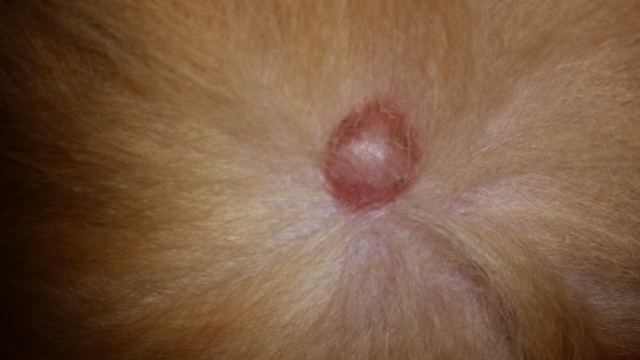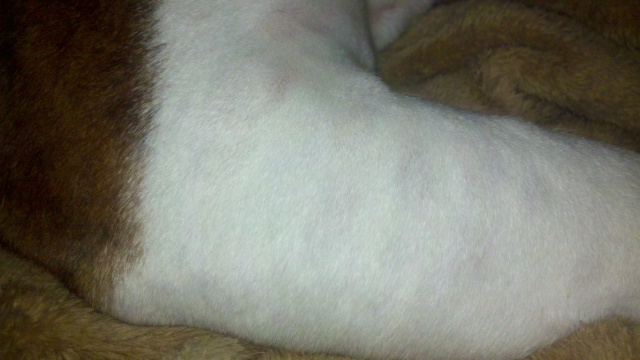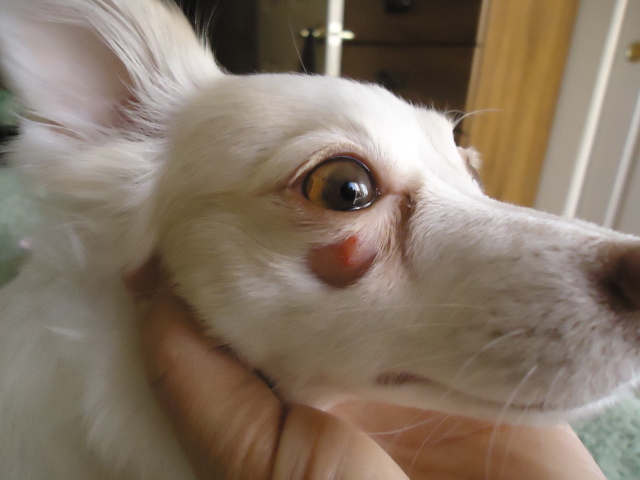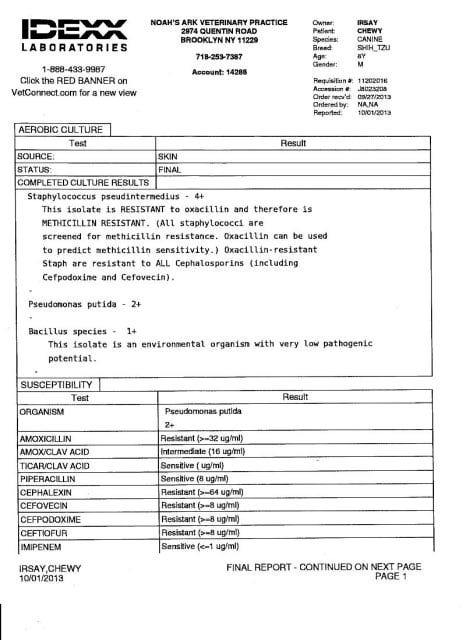QuestionHi There. I have a toy poodle 3 months old female puppy, her name is Honey. She's been with me for 4 weeks now. When I first got her she had a bloody diarrhea and vomited a couple of times, we thought it was Parvo, but gladly it was giandia (not sure how you spell that)! Her brother had the same problem and they were both treated and fine (he's been adopted by my friend). She still has very little diarrhea and we're trying to treat her for that by a number of pills that vert has given us, hopefully she'll be ok.
My bigger concern came when she started itching and biting her leg, back of her leg and itching behind her ear. We took her to the vet and she said there is no sign of fleas, skin looks clean, but then the vet noticed scabs (looks like clotted blood) on on her paws. She gave a course of antibiotics for 6 days, and said if she didn't get better we have to look at option B which is Steroids. Honey hasn't gotten better, she's still itching and biting herself, we took her to the vet today and she received a Steroid shot. Vet said it could be an allergy from food for now, so we need to start eliminating the dog food (she usually eats 3 meals a day, little rice and chicken with a sprinkle of dog food). In 2 days the vet asked me to come back and collect a couple of more steroid pills so we can try and eliminate the itchiness. She did mention though that once she's off the pills she will start to itch again if we don't find the cause (so it's just a temp relief).
I am honestly very concerned. I understand from reading that it's very difficult to sometimes determine the reasons of why they get these skin allergies, but what's the best way of knowing, or how can we do it? She's so little and she's already taking so many medications, I really hate this!
Just to give you some background, we live in a very hot and humid climate. We have a backyard, she's out a couple of times a day on the grass. She doesn't stay too long, max 4 mins to do her business. Her itchiness is not extremely severe, she itches probably 50 times a day but at intervals. If she's eating or sleeping, she wouldn't wake up or stop to itch - mostly whilst playing or walking around. If it is from the grass let's say, how can we know? I just don't know what I should do next, any input will be helpful!
Thank you.
AnswerPoor little thing! I am not sure why your vet hasn't given her an antihistamine for the itching as well as the steroid. While not the best solution, it can give her some temporary relief while you eliminate the cause of the itching.
Dogs will itch from many things- food intolerance, fleas, grasses, and inhalant allergies. Food intolerance is more common than a true food allergy, especially at this young age.
However, if she was fed chicken and other foods like that while recovering from any type of gastric bleeding and diarrhea, she could have developed an intolerance to these foods. The reason for this is that the intestinal walls are healing and while they are, if the dog eats heavier foods while these are healing, their proteins are liable to pass through the walls of the intestine and set up a huge allergic reaction. Every time the dog eats that food afterward it can have another allergic reaction.
Your puppy should be put onto a food specifically for allergies such as Hill's brand Z/D. You can have your vet order it as it is shipped world-wide. Otherwise you will have to start her on an elimination diet to discover the cause of this allergy. To do this, you must get her on a food that has a 'novel protein' source, that is, something she has never eaten like duck and potato. There are many foods on the market like this now that will make it easier for you to narrow down the suspicious food. While rice is rarely allergy-producing, chicken, beef, pork, soy and wheat are major sources of allergens.
So you must stop whatever food she is eating now and get her started on this elimination diet. You have to start them on it slowly with some of the old food and then gradually give the new food to prevent more diarrhea from starting. On that note you might want to give her another round of medicine for the giardia as well, since more parasites can hatch and re-infest her.
Another issue you might want to talk to the vet about is inhalant allergies, or atopic allergies as they are known as. This is when the dog is allergic to inhalants that cause an allergic reaction such as pollens, molds, mildew, trees, weeds, etc.
These are much harder to find unless you do blood work or skin testing of the dog. Once the identity of the offending items are found, a serum can be made and she can be given allergy shots just like people get. While these will not always remove the entire allergy, they have been shown to be effective in lessening the reactions to the allergens and allowing the dog to live a more comfortable life.
That is about the best information I can give you at this point Banah. I hope this helps some.
Please let me know how she does on the elimination diet.

 Soft pink blister looking on dogs side
Question
Blister on Golden Retr
I noticed a smal
Soft pink blister looking on dogs side
Question
Blister on Golden Retr
I noticed a smal
 Lumps on Dogs Legs and sides
Question
Front leg
This morning when I went to work my
Lumps on Dogs Legs and sides
Question
Front leg
This morning when I went to work my
 Worried
Question
eye
My long-hair chihuahua (1.5yr old) has had
Worried
Question
eye
My long-hair chihuahua (1.5yr old) has had
 My 8 month old Great Pyrenees Pup
QuestionBefore and After
Places on Legs
Q
My 8 month old Great Pyrenees Pup
QuestionBefore and After
Places on Legs
Q
 Ciprofloxacin
Question
Skin Culture Report Culture Report Page
Ciprofloxacin
Question
Skin Culture Report Culture Report Page